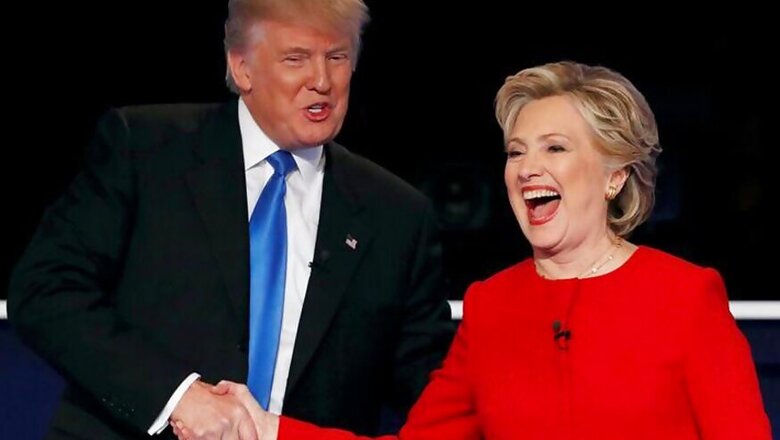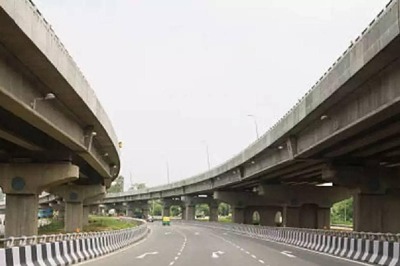
views
Washington: After nearly two years of bitterness and rancor, America will elect its 45th president Tuesday, making Hillary Clinton the nation's first female commander in chief or choosing billionaire businessman Donald Trump, whose volatile campaign has upended U.S. politics.
The winner will inherit an anxious nation, angry and distrustful of leaders in Washington. They'll preside over an economy that is improving but still leaving many behind, and a military less extended abroad than eight years ago, but grappling with new terror threats.
Clinton enters Election Day with multiple paths to victory, while Trump must win most of the roughly dozen battleground states up in order to clinch 270 Electoral College votes. Control of the Senate is also at stake, with Democrats needing to net four seats if Clinton wins the White House.
Like millions of Americans, Clinton and Trump planned to cast their votes Tuesday morning. The Democrat was heading to a polling place near her home in Chappaqua, New York, while the Republican was voting in Manhattan.
The candidates blitzed through the battleground states on Monday, accompanied by their families, political allies and celebrities. Clinton was expected to greet one more crowd in the early hours of Tuesday morning when her campaign plane lands in suburban New York.
In the campaign's final hours, the Democrat was buoyed by FBI Director James Comey's weekend announcement that he would not recommend criminal charges against her following a new email review. The inquiry had sapped surging Clinton momentum at a crucial moment in the race and risked damaging Democrats running in down-ballot races.
Clinton never mentioned the FBI review Monday and appeared to already have an eye on the challenges waiting after election. She bemoaned the caustic election season that sparked so much division, saying she'd come to "regret deeply how angry the tone of the campaign became."
The centerpiece of Clinton's final campaign swing was a massive rally on Philadelphia's Independence Mall, where she was joined by her husband, former President Bill Clinton, as well as President Barack Obama and first lady Michelle Obama.
"We know enough about my opponent, we know who he is," Clinton said as she addressed the 33,000-person crowd, her largest of the campaign. "The real question for us is what kind of country we want to be."
Clinton left for her home in Chappaqua, New York, after greeting supporters upon landing at Westchester airport at approximately 3:30 .a.m. EST.
Trump closed his improbable presidential bid in trademark style: flying across the country in his now-familiar private jet and headlining packed rallies filled with enthusiastic supporters. As he surveyed the crowd in Scranton, Pennsylvania, he declared: "It's been a long journey."
Trump ended his marathon final day of campaigning with a final rally in Grand Rapids, Michigan, where he implored his supporters to get out and vote.
"If we don't win, this will be the single greatest waste of time, energy and money in my life," he told them. "We have to win."
Trump's final event at a local convention center was surprisingly staid, with none of the theatrics of an earlier rally in a packed arena in New Hampshire that featured laser lights and smoke machines.
The businessman was aggressive to the end, slamming Clinton as the "face of failure." Having made the new FBI review a centerpiece of his closing case to voters, he argued that the Democrat was being protected by a "totally rigged system."
"You have one magnificent chance to beat the corrupt system and deliver justice," Trump implored his supporters. "Do not let this opportunity slip away."
Heading into Election Day, nearly 45 million people had already cast ballots in advance voting. About half of those votes were cast under the shadow of Comey's initial announcement of a new email review.
Clinton is banking in part on high turnout — particularly among Obama's young, diverse coalition of voters — to carry her over the finish line Tuesday. Roughly half the states with advance voting have reported record turnout, including Florida and Nevada, which have booming Hispanic populations, a possible good sign for Clinton.
In Florida alone, Hispanic participation is up by more than 453,000 votes, nearly doubling the 2012 level. Black turnout is up compared to 2012, but that share of the total vote is lower due to bigger jumps among Latinos and whites, according to University of Florida professor Daniel Smith
In Nevada, where more than three-fourths of expected ballots have been cast, Democrats also lead, 42 percent to 36 percent.
Trump deputy campaign manager David Bossie downplayed the impact of increased Hispanic participation, telling reporters on a conference call, "We feel that we're going to get a good share of those votes." However, he sidestepped questions about the level of Hispanic vote Trump needs to win the presidency.
Trump has eschewed the kind of investments in voter data and ground operations that propelled Obama to the White House and have been emulated by Clinton. His campaign was instead banking on the enthusiasm of his supporters to motivate them to show up to vote.
The Republican touted the "movement" he's created, but also warned it would all slip away with a loss Tuesday.
"Today is our Independence Day," Trump said in Grand Rapids. "Today the American working class is going to strike back."



















Comments
0 comment